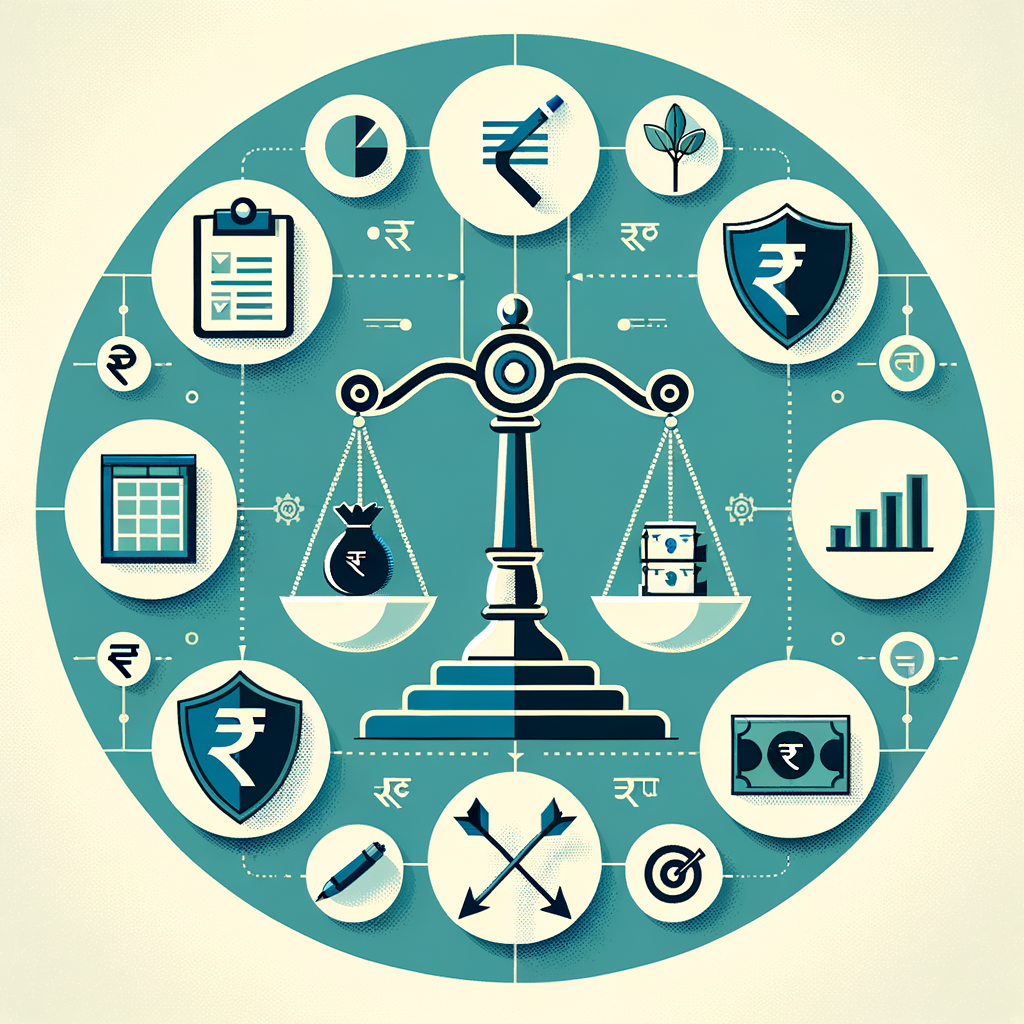Evaluating Debt Management Programs in India: How to Choose the Best Option
The constant pressure of juggling multiple EMIs, credit card bills, and loan payments can be overwhelming for many small business owners and salaried professionals across India. When your monthly outgoings start to feel like a losing battle against mounting interest, it’s easy to feel trapped. Fortunately, when debt becomes unmanageable, debt management programs offer a structured and viable path back to financial stability. However, choosing the right program is absolutely critical. A well-suited plan can be your lifeline, helping you reduce high interest rates and avoid legal complications, but an ill-chosen or predatory one can push you deeper into a financial crisis. This comprehensive guide will walk you through the various debt management programs India has to offer, explain how to evaluate them effectively, and highlight the critical red flags to watch out for. Often, these situations arise from common but avoidable errors; understanding the Top 10 Financial Mistakes Small Businesses Make can provide crucial context.
What Are Debt Management Programs and How Do They Work?
At its core, a debt management program is a professional service designed to help individuals manage and repay their unsecured debts, such as credit card bills, personal loans, and other non-collateralized credit. It is not a loan, but rather a strategic partnership with a financial agency that acts as an intermediary between you and your creditors. These programs are structured to simplify your repayment process and make your total debt burden more manageable, providing a clear and attainable route to becoming debt-free. The process is a welcome alternative to the stress of dealing with multiple lenders and payment dates, offering a single point of contact and payment.
The general process followed by most debt counseling services in India is straightforward and systematic. It begins with a detailed assessment where a financial counselor thoroughly reviews your income, daily expenses, assets, and all your outstanding debts to get a complete picture of your financial health. Based on this analysis, the agency negotiates with your various creditors on your behalf, often seeking concessions like lower interest rates, waivers on late fees, or a more favorable repayment schedule. Once an agreement is reached, all your separate payments are consolidated into a single, affordable monthly payment that you make directly to the debt management agency. The agency then takes on the responsibility of distributing this payment among your creditors according to the newly negotiated plan, ensuring everyone is paid on time until the debt is cleared.
Who Needs a Debt Management Program?
Wondering if a structured debt plan is the right step for you? These programs are specifically designed for individuals who have a regular income but are struggling to keep up with their debt obligations. Here is a checklist to help you determine if you might benefit from personal debt management solutions India:
- You consistently struggle to make more than the minimum payments on your credit cards or loans.
- Your debt-to-income ratio (total monthly debt payments divided by gross monthly income) is alarmingly high, often exceeding 40%.
- You have started receiving frequent calls or notices from collection agencies regarding overdue payments.
- You have a steady and reliable source of income but need a disciplined, structured plan to pay off your debts efficiently.
- You are looking for a responsible alternative to bankruptcy and want to repay what you owe under more manageable terms.
Exploring the Best Debt Management Options in India
When you decide to tackle your debt head-on, it’s important to understand the different avenues available. Each option caters to a specific financial situation, and what works for one person might not be suitable for another. Understanding the pros and cons of the best debt management options India offers is the first step toward making an informed decision that aligns with your financial capacity and long-term goals.
1. Debt Management Plan (DMP)
A Debt Management Plan (DMP) is a formal, structured arrangement administered by a credit counseling agency. This is one of the most common and effective debt management strategies India provides for individuals feeling overwhelmed by unsecured debt. In a DMP, the agency works with your creditors to potentially lower your interest rates and waive fees, then consolidates your various monthly payments into one single, manageable payment. You pay this amount to the agency, and they distribute it to your creditors. These plans typically have a fixed tenure, usually ranging from three to five years, offering you a clear timeline to become debt-free.
- Best for: Individuals with a stable income who can consistently afford the consolidated monthly payments but need help with organization, interest rate reduction, and a disciplined repayment structure. It’s an excellent choice for someone committed to paying off their debt in full but needing better terms to do so.
2. Debt Consolidation
Debt consolidation involves taking out a new, single loan to pay off several smaller, existing debts. This new loan could be a personal loan from a bank or an NBFC (Non-Banking Financial Company). The primary goal is to combine multiple high-interest debts into one loan that ideally has a lower interest rate, a single EMI, and a fixed repayment tenure. Unlike a DMP where an agency manages payments, with debt consolidation, you are responsible for managing and repaying this new loan yourself. Success hinges on your ability to secure a new loan with favorable terms and your discipline in not accumulating new debt. When considering this option, it’s vital to approach credible lenders, and you can find a list on the RBI’s list of regulated entities.
- Best for: Individuals who have a good or excellent CIBIL score and can therefore qualify for a new loan with a significantly lower interest rate than the average rate of their current debts. It simplifies finances but requires strong personal financial discipline.
3. Debt Settlement
Debt settlement is an aggressive approach and often considered one of the last-resort debt relief programs for individuals India. In this process, a company negotiates with your creditors to allow you to pay off your debt with a lump-sum amount that is less than the full amount you owe. While paying less than what you owe sounds appealing, this option comes with severe consequences. Creditors are under no obligation to agree to a settlement, and even if they do, the settled account will be reported to credit bureaus, causing significant and long-lasting damage to your CIBIL score. This makes it extremely difficult to obtain credit in the future.
- Best for: A final option for individuals facing extreme financial hardship, such as a major loss of income, who have no realistic way of repaying their debts in full and are trying to avoid bankruptcy. It should be approached with extreme caution and a full understanding of the negative impact on your credit history.
A Step-by-Step Guide to Evaluating Debt Management Plans India
Choosing a partner to help you navigate your financial troubles is a significant decision. The quality and integrity of the debt management agency you select will directly impact your success. Following a methodical evaluation process is key. This step-by-step guide on evaluating debt management plans India will empower you to make a confident and safe choice. When you are looking for how to choose debt management India, these are the non-negotiable checks you must perform.
Step 1: Check Credibility and Certifications
Before you share any financial details, your first priority is to verify the legitimacy of the company. A credible agency will be transparent about its credentials and operational history. Start by checking if the company is registered with the Ministry of Corporate Affairs (MCA) in India. Look for a physical office address and contact numbers that work. Scour the internet for independent online reviews, client testimonials, and any news articles or complaints associated with the company. Furthermore, ask if their financial counselors are professionally certified. A reputable organization will willingly provide this information, whereas a fraudulent one will often be vague, evasive, or lack a verifiable presence.
Step 2: Understand the Fee Structure
Legitimate debt management agencies charge fees for their services, but these should be reasonable and transparent. Before signing any agreement, demand a complete, written breakdown of all associated costs. Typically, you can expect an initial setup fee and a recurring monthly administration fee, which is often a percentage of your monthly payment or a flat rate. Be extremely cautious of companies that demand large upfront fees before they have provided any actual service, as this is a major red flag for a scam. It’s a wise practice to get quotes from at least two or three different agencies to compare their fee structures and ensure you are getting fair value.
Step 3: Analyze the Proposed Repayment Plan
The repayment plan is the heart of the program, and it must be realistic for your situation. The proposed consolidated monthly payment must be affordable and fit comfortably within your budget after accounting for essential living expenses. If the payment is too high, you risk defaulting on the plan itself, which would defeat the entire purpose. Ask for a clear projection of the total repayment period – how many months or years will it take to clear your debt completely? Crucially, get written confirmation of which of your debts are included in the plan and the new, negotiated interest rates for each. Do not proceed based on verbal promises alone.
Step 4: Inquire About the Impact on Your CIBIL Score
A debt management program will impact your CIBIL score, and it’s essential to understand exactly how. Ask the agency to explain how the program will be reported to credit bureaus like CIBIL. For instance, enrolling in a DMP might result in a remark like “under debt management” or “settled” on your credit report. While this has a negative impact, it is significantly less damaging than having multiple “defaults” from missed payments. Debt settlement, on the other hand, is much more harmful and will severely lower your score for a long time. A trustworthy counselor will be upfront about these impacts and help you understand the long-term journey of rebuilding your credit. A key part of this journey is understanding How to Track Your Credit History Using Your PAN Card Via CIBIL. For more information, you can always refer to the official CIBIL website to understand how your report works.
Red Flags: How to Spot a Debt Management Scam
Unfortunately, the debt relief industry can attract predatory companies looking to profit from people in vulnerable financial situations. Building trust with your chosen agency is paramount, and knowing the warning signs of a scam can protect you from further financial harm. Be on high alert and walk away if you encounter any of the following red flags:
- Guarantees of “debt freedom”: No legitimate company can guarantee that your creditors will agree to negotiate or that your debt will be completely forgiven. Such promises are unrealistic and a classic sign of a scam.
- High upfront fees: Reputable agencies typically collect their fees from the monthly payments you make. A company demanding a large sum of money before performing any services is likely a fraudulent operator.
- Pressure tactics: Be wary of any company that uses high-pressure sales tactics, urging you to sign up immediately “before the offer expires.” A legitimate counselor will give you time to review the contract and make a thoughtful decision.
- Advice to cut off creditors: A scam artist might tell you to stop all communication with your creditors. A real debt counselor will help you manage communication and will work with your creditors, not advise you to ignore them.
- Lack of a written contract: Never, under any circumstances, agree to a plan or make a payment without a detailed, written contract. This document should clearly outline the terms, fees, payment schedule, and services provided.
Conclusion
Finding your way out of the maze of debt is entirely possible with the right strategy and support. The journey begins with understanding the different debt management programs available and conducting careful, diligent research to choose the one that best fits your circumstances. By following a structured evaluation process—checking for credibility, understanding all fees, meticulously analyzing the proposed plan, and being aware of the credit score implications—you can confidently select a reputable partner. Remember to stay vigilant for red flags that signal a potential scam. A well-chosen debt management program is more than just a repayment plan; it’s a powerful tool that empowers you to regain control of your finances and build a more secure future.
Feeling overwhelmed by debt? The financial experts at TaxRobo can provide a confidential assessment and guide you towards the most effective debt management strategies India has to offer. Contact us today for a consultation.
Frequently Asked Questions (FAQs)
Q1: Will joining a debt management program in India hurt my CIBIL score?
Answer: Yes, enrolling in a debt management program can have a temporary negative impact on your CIBIL score. Your accounts might be closed and marked as “under debt management” or “settled” upon completion. However, this is far less damaging in the long term than accumulating multiple defaults, late payments, and charge-offs on your credit report. Consistently making your payments through the program is the first crucial step toward eventually rebuilding a healthy credit score once you are debt-free.
Q2: How long does a typical Debt Management Plan (DMP) last?
Answer: Most Debt Management Plans (DMPs) in India are structured to be completed within a period of 3 to 5 years. The exact duration depends on several factors, including the total amount of debt you have enrolled, the new interest rates negotiated by the agency, and the size of the consolidated monthly payment you can comfortably afford.
Q3: Can I enroll business loans into a personal debt management program?
Answer: Generally, personal DMPs are designed specifically for unsecured consumer debts like credit cards, personal loans, and medical bills. Business loans, especially those that are secured with assets, operate under different terms and legal frameworks. It is crucial to discuss your business debts with a financial advisor or a specialized corporate debt consultant to explore solutions tailored for business liabilities.
Q4: What is the difference between debt counseling and a debt management program?
Answer: The terms are often used together, but they refer to different levels of service. Debt counseling services in India typically focus on the educational aspect: a counselor helps you with budgeting, financial planning, and understanding your options, empowering you to create a plan that you can execute yourself. A debt management program is a more formal, hands-on arrangement where the counseling agency actively intervenes on your behalf by negotiating with creditors and managing your monthly debt payments for you. Counseling is often the first step before deciding if a full-fledged program is necessary. For a deeper dive, read our guide on Credit Counseling vs. Debt Management Plans: What’s the Difference?.



